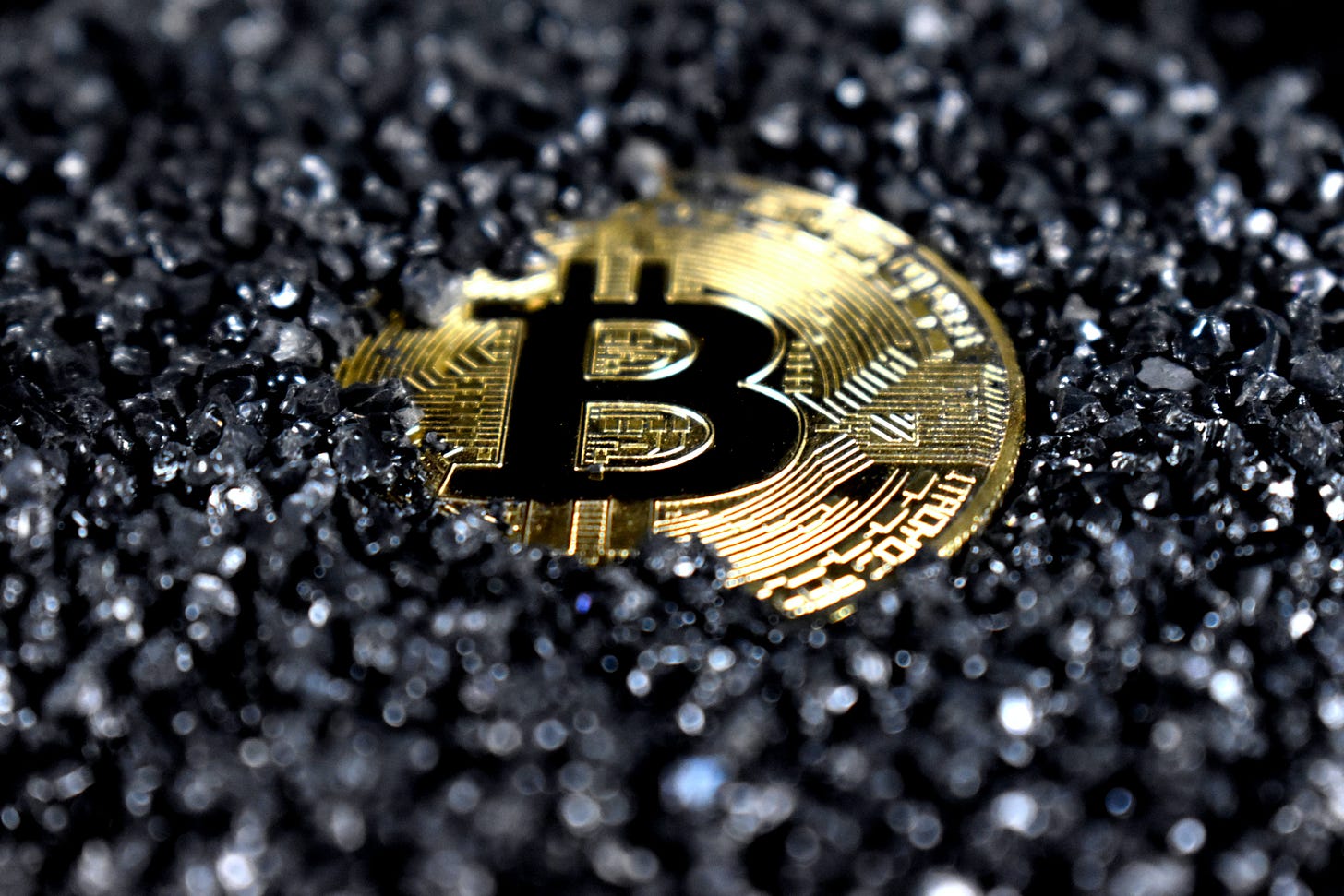
Number of the Week: $52.7 million (explanation below)
Can Democracies Truly Ban Crypto?
In an era of polarization, it’s always useful to examine where views overlap. This year, FIN has heard conservative-libertarian people predict that the US government will eventually ban Bitcoin and cryptocurrency (because they distrust government and think that it will always seek to crush any threat to its power); and heard people on the left argue that government should ban crypto (because it’s used for nefarious purposes and it undermines monetary policy.)
Both sides, curiously, assume that the US government—or, presumably, the national government of any large democracy—has the power and authority to shut down an asset class now estimated to be worth some $3 trillion. This is a highly questionable assumption. There are a handful of countries that formally ban cryptocurrency, including Bangladesh, China, and Ecuador, but they are almost uniformly authoritarian nations with long histories of similar capital controls. Could a democracy actually pull off a crypto ban?
Obviously, in a purely logistical sense, a democratic government can pass a law outlawing cryptocurrency—just as a democratic government can pass a law outlawing alcohol, or marijuana, or sunlight. Most 21st century democracies avoid passing laws that can’t be enforced, yet the perceived cryptocurrency threat continues to tempt many to at least consider the proposition. For months, it has been forecast that India—often considered the world’s largest democracy—intends to ban cryptocurrency, even threatening violators with being arrested without bail.
Yet the momentum behind this effort seems to be fading, as the Indian government begins to recognize that any effective ban would need to be international in scope. In a surprisingly short speech on Dec. 11, at the virtual Summit for Democracy, India’s Prime Minister Narendra Modi said, “We must also jointly shape global norms for emerging technologies like social media and cryptocurrencies so that they are used to empower democracy, not to undermine it.” Subsequent news reports have indicated that the crypto ban bill may be delayed for weeks.
In the US, there have been next to no formal proposals to ban crypto. The challenge is not merely technological, but also political. A recent Pew Research Center poll found that 16% of American adults—approximately 32 million people—have used cryptocurrency in some form. To create a criminal class that large would be daunting.
For better or worse, capital controls have never been a consistent American policy approach. There are a few historical exceptions, the deepest and longest-lasting of which is the “Gold Prohibition” instituted by FDR a few days into his first term. As part of a wider attempt to get a hold of the Depression economy, FDR and Congress made it illegal for anyone in America to own gold in any financially meaningful way (tooth fillings, jewelry and works of art did not count).
There are several aspects of that history to consider in the crypto context:
1) It was hastily passed legislation in an emergency setting; essentially no one in Congress read the bill because there were no copies of it. There were no hearings, there was no floor debate.
2) There was no confiscation system in place or even envisioned: gold-owning Americans were asked to turn in their gold to Treasury for a set rate, and by all accounts, many did (although there is no way of knowing what percentage took their chances and held on). A handful of cases were brought against people known to own gold, but as best I can tell—and I've looked—no one went to jail or even paid a substantial fine for refusal to comply. If anyone had, you can be sure that today's goldbug movement would celebrate them as martyrs.
3) While there may be a defense of what FDR did as a temporary measure, there is not one iota of evidence that anyone in the administration wanted or expected this Prohibition to last for 40 years—but it did. The distortions that Gold Prohibition created, domestically and abroad, are incalculable.
If you try to apply these lessons to the “banning” of crypto, you immediately run up against confusion and infinite complexity. Would Americans be asked to “turn in” their crypto holdings? Would the US government be able to chase after Americans who own crypto and confiscate it? Through what method would the government be able to confirm that any given individual still held crypto? Right now, crypto market capitalization is estimated at $3 trillion. If the US (or any) government wanted to acquire that, where would the money come from? At what rate would crypto owners be compensated?
One further historical note to underscore the technology problem: As legislative and market resistance to Gold Prohibition began to gather steam in the ‘60s and ‘70s, one creative channel was that US citizens would buy gold in Canada and have it stored in a Canadian bank’s safety deposit box. This was an expensive and clunky process, and it seems unlikely that any more than a few hundred or thousand US citizens did it. But the analogous crypto effort—move a digital wallet to a cloud location outside US borders—can be done at a click.
Countries including India may pass legislation outlawing decentralized cryptocurrency as part of their efforts to roll out digital currencies run by their own central banks (the digital yuan experiment is well underway). But it’s an illusion to think that such legislation will actually get rid of cryptocurrency. In February, Nigeria banned its licensed banks from conducting crypto transactions. Within a few months, crypto transactions in the country tripled.
FINvestments
🦈Number of the Week: The London- and Poland-based Ramp provides a service allowing an in-app crypto purchase without sending users to another platform. This week it announced a $52.7 million fundraising round.
🦈Given worldwide regulatory action, it was only a matter of time before the Binance empire began to tumble. This week Binance’s Singapore operation withdrew its application to run a market there.





It'd be extremely difficult for a democracy to ban and seize crypto assets, but they wouldn't need to. The treasury department and FBI could simply declare that ALL transactions between crypto and regular currencies are now presumed to be money laudering unless proven otherwise. Basically ending cryptocurrencies as a meaningful asset class.
It'd be extremely difficult for a democracy to ban and seize crypto assets, but they wouldn't need to. The treasury department and FBI could simply declare that ALL transactions between crypto and regular currencies are now presumed to be money laudering unless proven otherwise. Basically ending